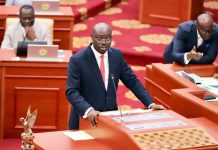Mr Kojo Oppong Nkrumah, the Minister for Information, has pleaded with the opposition National Democratic Congress (NDC) Minority in Parliament to look at the interest of the country and collaborate with the Majority to pass the three outstanding revenue bills to enable government to secure executive board level agreement with the International Monetary Fund.
The country has already reached a staff level agreement with the Breton Woods Institution and is on the verge of securing $3 billion bailout, if the three revenue bills – Income Tax (Amendment) Bill, Excise Duty and Excise Tax Stamp (Amendment) Bills as well as the Growth and Sustainability Levy Bill, which are expected to rake in over $4billion annually if passed by the legislative House.
Speaking to news men in Accra yesterday, the Information Minister said the passage of the three bills will compliment the positive news of creditors expressing willingness to assist Ghana with financing assurances to secure the IMF bailout.
The international and domestic bond markets are shut for the financing of government’s programmes, forcing government to rely on the Treasury Bills and Concessional loans as the primary sources of financing for the 2023 fiscal year.
This is also crucial because as part of prior actions in the IMF Staff Level Agreement, the BoG and the Ministry of Finance have finalised a Memorandum of Understanding (MoU) on zero financing to the budget, which will be signed soon.
The minister told the reporters that with the commitments made by external creditors, it behoves on parliament to show good faith by passing the revenue bills in the supreme interest of the country.
He pointed out that failure to pass the bills will amount to holding all the efforts made to save the economy hostage which can derail the progress made so far.
The Information Minister is hopeful that the passage of the bills in addition to all the agreed prior actions in the staff level agreement to secure the bailout will be critical in resetting the economy on the path of recovery, including putting it firmly on a disinflation path and sustained growth
Factors that adversely affected Ghana’s macroeconomic
The COVID-19 pandemic, rising global food prices, rising crude oil and energy prices; and the Russia-Ukraine war adversely affected Ghana’s macro-economy, with spillovers to the financial sector.
The combination of adverse external shocks had exposed Ghana to a surge in inflation, a large exchange rate depreciation and stress on the financing of the budget, which taken together have put public debt on an unsustainable path.
The object of the Income Tax (Amendment) Bill 2022 is, therefore, to amend the Income Tax Act, 2015 (Act 896) to revise the rates of income tax for individuals and introduce an additional income tax bracket.
It will introduce a withholding tax rate on the realisation of assets and liabilities and on winnings from lottery, unify the loss carried forward provisions and revise the treatment of foreign exchange losses.
The Bill will also increase the optional rate for individuals on the gain from the realisation of an investment asset, revise the upper limits for the quantification of motor vehicle benefits and increase the concessional income tax rates.
The individual personal income tax bands have been reviewed to accommodate the minimum wage for 2023 as the basic tax free income and an additional band at 35% as part of the high net worth taxation policy. The upper limits for quantification of motor vehicle benefits have not been revised since 2015.
Government has, therefore, revised these upper limits to account for inflation. Compliance with the requirements for payment of tax on realisation of assets and liabilities is being made more efficient with the introduction of a return to be submitted within 30 days of the realisation and a withholding tax.
The optional tax rate for individuals on the gain from realisations has also been increased.
The rate for income from gifts will also be increased as a consequential amendment.
The loss carried forward provisions are being unified at five percent while the treatment of foreign exchange gains is being restricted to actual losses.
Foreign exchange losses relating to capital expenditure is also to be capitalised.
The income tax rates for temporary concessions are being reviewed upwards with the intent to gradually phase them out.
These amendments are considered necessary to support the growing economy and will lead to a revenue yield of approximately GH₵1.290 billion.
Excise Duty (Amendment) Bill, 2022
The object of the Excise Duty (Amendment) Bill, 2022 is to amend the Excise Duty Act, 2014 (Act 878) to revise the excise tax rates for cigarettes and other tobacco products to conform with the Economic Community of West African States (ECOWAS) Protocols and raise revenue to mitigate the harmful effects of these excisable products.
The Bill will increase the excise duty in respect of wine, malt drinks and spirits; and impose excise duty on sweetened beverages and electronic cigarettes and electronic liquids to increase revenue.
The ECOWAS directive on the harmonisation of excise duties on tobacco products directs that the excise duty on tobacco products must include an ad valorem duty and a specific duty.
Specifically, the ad valorem rate is required to be 50% or more while the specific tax is required to be the minimum equivalent of $0.02 per stick in the case of cigarette, cigar and cigarillo and the cedi equivalent of $20 per net kilogramme for all other tobacco products.
The Bill also seeks to amend Act 878 to implement this Directive in line with Ghana being a member of ECOWAS.
There has been an increase in the use of electronic cigarettes and other smoking devices over the last decade.
Currently, these products do not attract excise duty, but Excise duty will be imposed on these products as the nicotine and other chemicals used as additives are also harmful.
Apart from mineral waters and malt drinks, all other sweetened beverages, including processed fruit juices do not attract excise duty.
The Bill amends Act 878 to impose excise duties on these products and increase the excise duty on mineral waters and malt drinks.
Spirits have a higher alcohol content compared to beer but the excise duty on spirits is lower than that of beer.
To address this, the excise duty on spirits is being raised above that of beer in accordance with good practice on the imposition of excise duties.Consequentially, the excise duty on wines has been reviewed upwards.
For ease of reference and the record, the descriptions of the various products are being revised to conform to the World Customs Organisation Harmonised Commodity Description and Coding System.
The Bill amends Act 878 by substituting the First Schedule with a new Schedule.The rationale for the amendment is to revise the excise tax rates for cigarettes and other tobacco products to align with the ECOWAS Protocols and impose new excise tax rates on sweetened beverages.
The passage of the Bill will yield approximately GH₵450 million.
Growth and Sustainability Levy
The object of the Bill is to impose a special levy to be known as the Growth and Sustainability Levy to raise revenue for growth and fiscal sustainability of the economy.
The Corona-virus Disease (COVID-19) pandemic led to a significant reduction in revenues and increased expenditure enormously.
The double jeopardy of the Russian-Ukraine war has also resulted in unprecedented global crises, depreciation in currencies and impacted living conditions and inflation levels.The Ghanaian economy has not been spared these shocks.
Further interventions are required to raise additional revenue for national development and social protection for the vulnerable. The introduction of the Growth and Sustainability Levy is part of Government’s efforts to raise funds for carrying out these interventions.
The Levy is to be imposed on profit before tax of the companies and institutions and on• production in the case of mining, upstream oil and gas companies specified in the first column of the Schedule.
The estimated revenue for 2023 is approximately GH₵2.216 billion. The Levy is subject to review by the Minister responsible for Finance in 2025.










